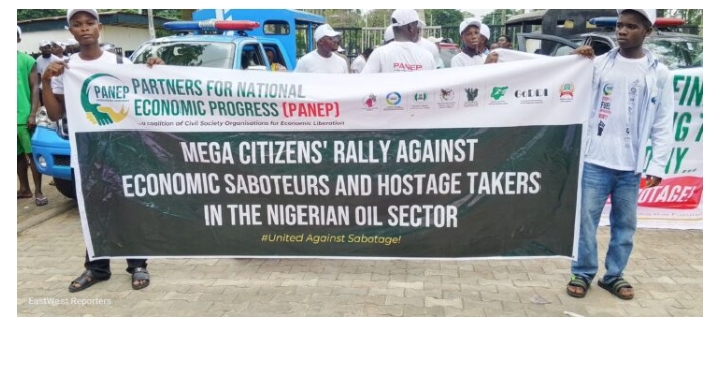
– Decry Dangote’s reliance on imports
Mkpoikana Udoma
Port Harcourt — In a bold call for energy sovereignty and industrial revival, stakeholders in Nigeria’s downstream oil sector, alongside civil society groups, have urged President Bola Ahmed Tinubu to mandate the Nigerian National Petroleum Company Limited, NNPC Ltd, to prioritize crude oil supply to local refineries over foreign export commitments.
The demand was made during a “National Unity Against Sabotage” mega rally held in Port Harcourt, Rivers State, where participants expressed concern that local refineries, especially the Dangote Refiner, are being starved of domestic crude, forcing them to source feedstock from the international market.
Convener of the Partners for National Economic Progress, Olamide Odumosu, described the development as a national embarrassment, accusing some government agencies of hiding under the “willing supplier, willing buyer” clause of the Petroleum Industry Act, PIA, to frustrate the refinery’s crude supply.
>“It is unacceptable that as an oil-producing country, a Nigerian refinery of global repute like Dangote’s has to import crude oil to stay operational,” Odumosu said.
“This is not just an economic concern, it’s a matter of national pride and sovereignty. The government must ensure that NNPC prioritizes crude allocation to local refiners.”
He explained that the PIA explicitly provides that upstream producers must make crude available to domestic refineries at reasonable prices, adding that regulatory agencies are empowered to enforce compliance where necessary.
“Both the spirit and letters of the Petroleum Industry Act mandate operators to supply crude to domestic refineries to protect investments and encourage in-country value retention,” Odumosu stressed. “It is a patriotic duty, not a favour, to ensure our refineries thrive.”
The activist lamented that while Nigeria celebrates the expansion of the Dangote Refinery from 650,000 barrels per day to 1.4 million barrels per day, the facility continues to rely on imported crude due to bottlenecks in domestic supply.
“We are not just fighting for Dangote. We are fighting for every indigenous refinery, from modular operators to new investors. If they cannot access crude, Nigeria’s dream of energy self-sufficiency will remain a mirage.
“This expansion is not just a national achievement, it’s a continental one,” Odumosu stated. “It should not be undermined by policy sabotage or bureaucratic inertia. The refinery’s success represents Nigeria’s industrial revival and energy independence.”
Also speaking, Comrade Danielson Prince, Convener of the Niger Delta Youth Council, warned that allowing local refineries to depend on foreign crude undermines the nation’s economic interests and contradicts the objectives of the Renewed Hope Agenda.
“It is detrimental to our economy that we export crude and import refined products,” Prince said. “The president must direct NNPC to ensure that Nigerian crude is sold first to Nigerian refiners before any foreign buyers. Anything less is economic sabotage.”
He added that the ongoing advocacy was part of a broader campaign to restore transparency and accountability in Nigeria’s petroleum value chain.
“This is both a journey and a struggle,” Prince said. “We will not rest until the right policies are implemented and Nigeria fully benefits from her God-given resources.”
The groups maintained that the stability of the downstream sector, job creation, and foreign exchange conservation depend largely on ensuring consistent crude availability for local refineries, including modular plants across the Niger Delta.
Similar rallies were held simultaneously in Abuja, Kaduna, and Asaba, drawing participants from youth movements, oil sector unions, and economic advocacy groups—all united in urging the federal government to make crude supply to local refineries a non-negotiable national policy.
This article was originally posted at sweetcrudereports.com
Be the first to comment